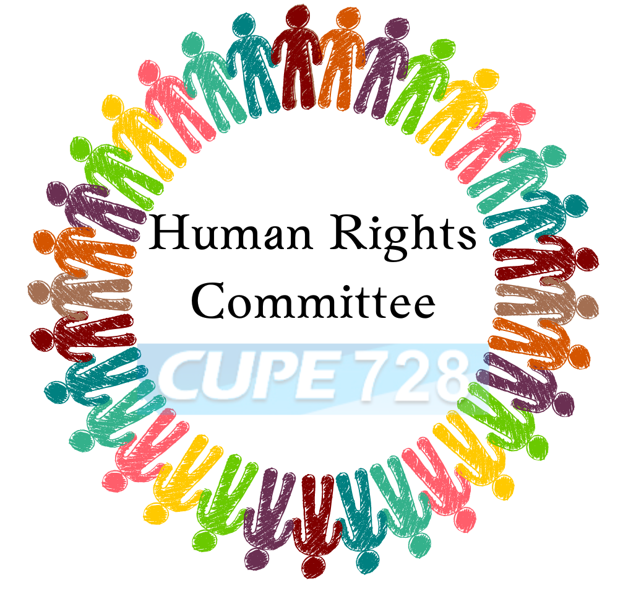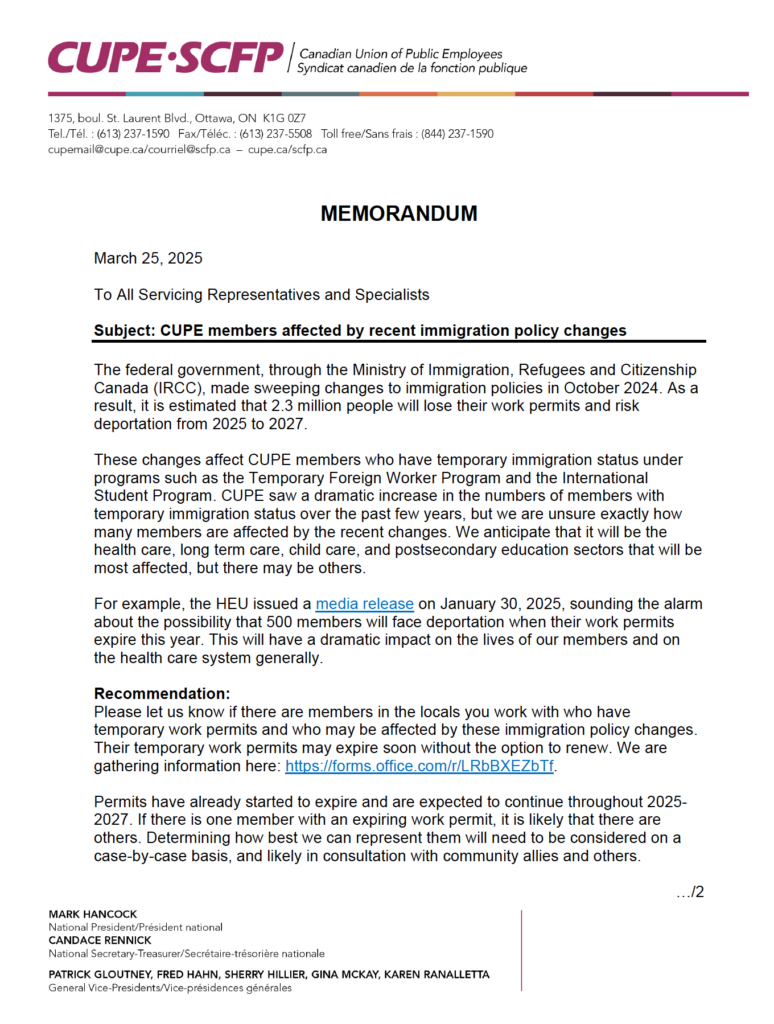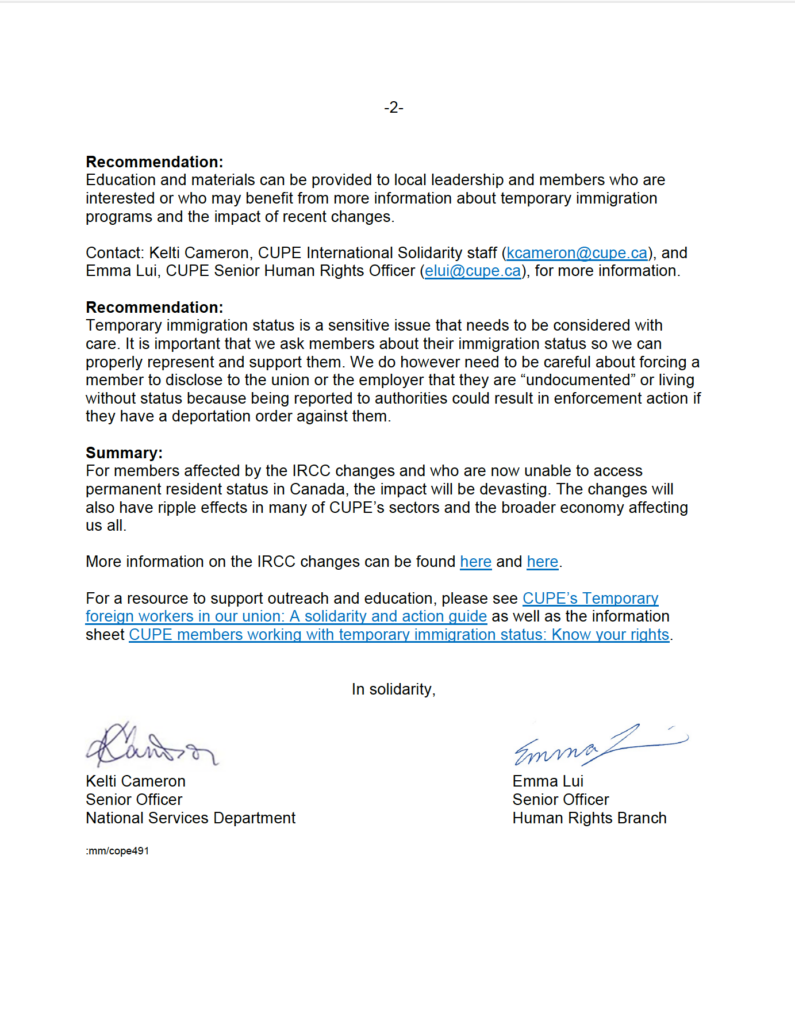This page is updated by both the Human Rights & Equity Committee members either the Communications Officer at commofficer@cupe728.ca or the union office at office@cupe728.ca
 The Human Rights and Equity Committee shall consist of not less than three (3) members. This committee shall strive to achieve and maintain the following objects:
The Human Rights and Equity Committee shall consist of not less than three (3) members. This committee shall strive to achieve and maintain the following objects:
a) To promote a solid understanding of human rights
b) To promote the principles of equal rights and equity from a union perspective.
c) To encourage recognition of an action that would eliminate stigmas, stereotypes and other barriers facing minority groups.
d) To involve as broad a cross section of people as possible in any and all union and community endeavors.
e) To promote fair and equitable treatment for all. The committee shall work in conjunction with CUPE BC and CUPE National in order to achieve the above goals with the utmost efficiency and timeliness.
All reports and proposals of this Committee shall be made available to the members for information at the next general meeting, following presentation to the Executive. Also, the reports and proposals are to be published in the monthly Chronicle that precedes the meeting the reports and proposals are tabled at.
The 2025/2026 Committee consists of the following CUPE728 members:
- Edward Parsotam
- Manny Tunchez
- Rasbir Sangha
- Rabir Waraich
- Rupal Singh
Sept 2025
Article : National Truth and Reconciliation day
Written by the Human Rights & Equity Committee on behalf of CUPE728
How great is it that we reside in a nation that recognizes many ethnic cultural days of recognition?
What’s been identified is that visitors who have come to Turtle Island have brought their beliefs and celebrations and passed them on to Canadians to highlight and celebrate. Even those who were brought here for work, to build infrastructure and transportation, and those who came with families, are now celebrating or highlighting their own cultures and traditions.
But what about those who have been here on Turtle Island long before any of us?
What about the First Peoples — the original stewards of this land since time immemorial?
Are there days that Canada has officially recognized to honor them?
Yes, But until recently, these days have often been overlooked or forgotten by many. One of the most important among them is National Truth and Reconciliation Day, also known as Orange shirt day, observed each year on September 30.
This day is not just symbolic, it’s a sad reminder of a painful and often hidden part of Canadian history: the residential school system, which operated for over 150 years. During this time, more than 150,000 Indigenous children were taken from their families and forced into government- and church-run schools with the intent to erase their language, culture, and identity. Many faced neglect and abuse. Thousands did not survive.
Truth and Reconciliation Day is about acknowledging that truth. It’s a time for all of us — Indigenous and non-Indigenous — to learn, reflect, and engage in conversations that move us toward understanding, healing, and meaningful change.
It’s not just about history, it’s about the present and the future.
It’s about honouring the strength and resilience of Survivors and their families.
It’s about recognizing that reconciliation is not a destination; it’s a process that requires ongoing effort, respect, and action.
As we continue to celebrate the diverse cultural fabric of this country, let us also ensure we are not ignoring or sidelining the foundational cultures upon which this land was built. Let us elevate Indigenous voices, stories, and truths — not just on September 30, but throughout the year.
Reconciliation starts with awareness — and awareness begins with listening.
April 2025
Links from the Memorandum:
HEU issued a media release on January 30, 2025.
We are gather information here
More information on the IRCC can be found here and here.
For a resource to support outreach and education, please see CUPE’s Temporary foreign workers in our union: A solidarity and action guide as well as the information sheet CUPE members working with temporary immigration status: Know your rights.
February was Black History Month and CUPE 728’s Human Rights & Equity Committee shared information and highlights throughout the month, including
Rosa Parks
Yvonne Squires
Nov 2024
June is Indigenous History Month in Canada, a time to celebrate and learn about the diverse cultures, languages, and traditions of Indigenous peoples in Canada. In BC, there are 203 nations and 30 distinct language groups, with over 60 dialects. Ninety-five percent of BC is on unceded (stolen) First Nations territory. Unceded means that First Nations people never ceded or legally signed away their lands to the Crown or to Canada. Take a few minutes to visit www.native-land.ca and learn about the Indigenous nation(s) that reside on the land you currently occupy. It is important to acknowledge the territory and its original name, as well as understand the meaning behind it. This simple act of learning the place name is a meaningful first step in recognizing and respecting Indigenous lands and peoples.
The rich history of Indigenous peoples in Canada spans thousands of years, reaching back to time immemorial. A notable example of this enduring legacy is the recovery of artifacts from a BC Heiltsuk First Nation village site, which dates back over 14,000 years. This discovery, as reported in the Vancouver Sun, provides tangible evidence of the deep roots and ancient presence of Indigenous communities in North America. https://vancouversun.com/news/local-news/heiltsuk-first-nation-village-among-oldest-in-north-america-archeologists/
During this time, Indigenous people have contributed to Canada’s culture in many ways. Click on these 7-minute video links to learn more about Food and Health contributions https://vimeo.com/275309033 and about contributions to Transportation, Games, and other items https://vimeo.com/275308223
As Canadians begin to learn more about the history of Canada, which is 156 years old this year, it is important to remember that the treatment of Indigenous people is marred by centuries of colonization, forced assimilation, and systemic oppression. Indigenous communities have endured and continue to experience the devastating impacts of residential schools, land dispossession, cultural genocide, and ongoing challenges in achieving justice, equality, and reconciliation.
One of the most important facts to face is that Indigenous women, girls, two-spirit, and children are still statically the most harmed groups in our country. Missing and Murdered Indigenous Women, Girls and Two-Spirit People (MMIW2S) are 12 times more likely to be harmed by kidnapping and murder. They are often the subject of many unsolved cases, oftentimes because the police and justice system do not act quickly or efficiently. To learn more about what two-spirit means, read this CBC Kids article https://www.cbc.ca/kids/articles/do-you-know-what-two-spirit-means
According to the last census, Indigenous children in the child welfare system make up 53.8 percent of children in foster care, despite making up only 7.7 percent of the population. This overrepresentation reflects the urgent need for addressing systemic barriers, promoting culturally appropriate support services, and prioritizing Indigenous self-determination in child welfare policies and practices. Read more about the Cowesses First Nation becoming the first to control its child welfare system in July 2021, https://globalnews.ca/news/8005532/cowessess-first-nation-child-welfare-law/
The purpose of Indigenous History Month is to acknowledge this history, celebrate the resilience of Indigenous peoples, and create opportunities for non-Indigenous Canadians to learn about and engage with Indigenous culture. Indigenous consultants in BC, such as Elaine Alec https://www.naqsmist.com/ and Len Pierre https://www.lenpierreconsulting.com/ and offer online and in-person workshops, free YouTube videos, and slides on transformative storytelling and cultural safety.
A good place to start is Len’s 3-minute video about 5 Things You Need to Know About Truth and Reconciliation https://youtu.be/AtR331kTFG0 or if you have more time (1:20) check out Elaine’s Cultivating Safe Spaces https://youtu.be/1TA3x43jrRE
On June 21st, National Indigenous Peoples Day, Canadians can take the challenge to learn more about Indigenous peoples of Canada by educating themselves and actively seeking opportunities for learning. Whether Indigenous or non-Indigenous, we all have a role to play in reconciliation. The #Next150 https://next150.indianhorse.ca/ challenge offers 21 tasks issued by community leaders and activists designed to push thinking and understanding of Indigenous issues. By participating, sharing knowledge, supporting Indigenous initiatives, and amplifying Indigenous voices, Canadians can contribute to a safer, more prosperous, and more understanding country.
Throughout the month of June, there are numerous events and activities taking place across BC and Canada, including festivals, Pow Wows, art exhibitions, film screenings, markets, and educational workshops. The Aboriginal People’s Television Station (APTN) brings people together with a live-streaming a June 21st celebration of cultural and musical performances, including achievements of First Nations, Inuit and Metis Peoples across Turtle Island.
Here’s a link https://www.cbc.ca/kids/articles/turtle-island-wheres-that you can review with your children to learn more about why Canada is referred to as Turtle Island and a link to the press release for the 2023 Indigenous Day Live, themed “Celebrating Our Youth” https://www.aptn.ca/save-the-date-mark-your-calendars-aptn-indigenous-day-live-idl-returns-in-full-force-for-2023/
These events serve as a platform for Indigenous peoples to share their rich culture and history while offering non-Indigenous Canadians a chance to learn and engage in important conversations. Let us seize this opportunity to learn, listen, and collectively strive for a better future that embraces understanding and unity for everyone.

